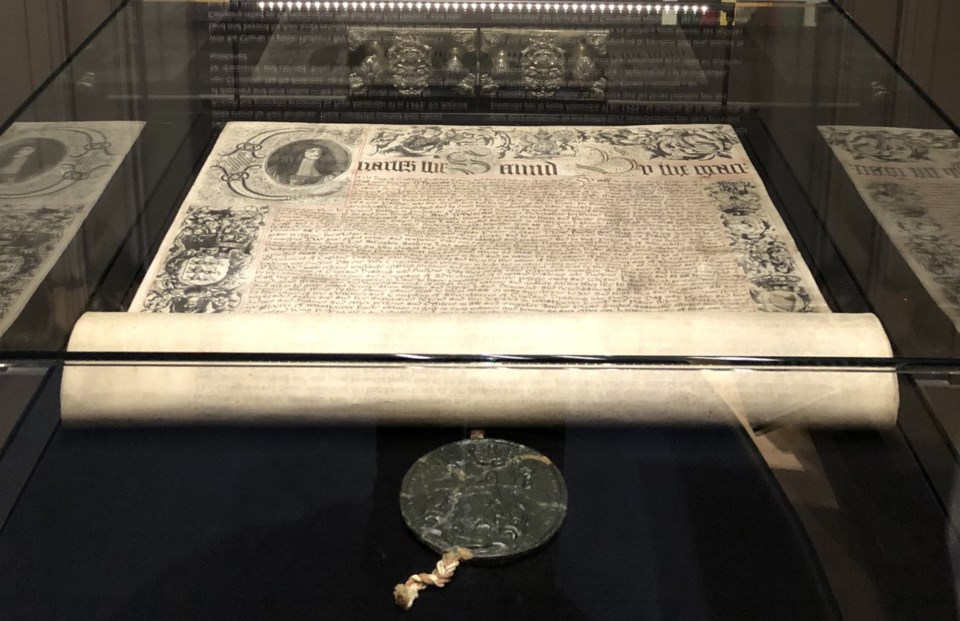TORONTO — Hudson's Bay can now prepare to auction off 4,400 artifacts and art pieces along with the 355-year-old royal charter that launched the now-ailing company.
Superior Court judge Peter Osborne gave the department store chain permission Thursday to move forward with a sales process run by auction house Heffel Gallery Ltd.
Hudson's Bay will still have to return to court at a later date to detail exactly what items beyond the charter it wants to sell and propose how Heffel's auction process will unfold, but Osborne said he thought it was "reasonable" to let the retailer start proceeding as long as it balances the needs of the company with its creditors and other stakeholders.
Hudson's Bay, which filed for creditor protection in March because it could no longer pay its bills, wanted permission to auction off 1,700 pieces of art and more than 2,700 artifacts in hopes of helping to pay creditors.
While it had initially included the items in a sales process it began last month, Hudson's Bay lawyer Maria Konyukhova said the company eventually realized that avenue "doesn't really work for the art collection" because many of the items have deep cultural and historical significance.
As soon as it became apparent items like the 1670 charter would be up for sale, archival institutions, governments and historians started voicing concerns that significant pieces in the collection would become inaccessible to the public or wind up on the walls of millionaires.
The Assembly of Manitoba Chiefs has requested a halt to any auction because it believes the collection includes items of "profound cultural, spiritual, and historical significance to First Nations people."
These concerns appeared to weigh on Osborne. He asked Konyukhova about several hypothetical situations, such as whether an auction would prevent Canada Post from turning any of Bay artifacts into a stamps or Canada's archives from scanning the charter to preserve a record.
He also questioned whether items could be removed from the auction block should it be realized that someone else has a claim to their ownership or they are found to have historical, cultural or social value.
“There is nothing obligating Hudson’s Bay to sell all of the pieces," Konyukhova assured him. "There is nothing meant to tie up the assets in any way."
Before giving Hudson's Bay the go-ahead, Osborne heard from Asad Moten, a lawyer representing the attorney general of Canada and several other federal government bodies.
“Canada cautiously does not oppose” Hudson's Bay's move to auction off its artifacts, Moten said. "I say cautiously because Canada has not been afforded a chance to catalogue the artifacts."
While Konyukhova didn't offer up any precise hints as to what it is in the collection, a source familiar with the auction process, who was not authorized to speak publicly, has told The Canadian Press the items proposed to be auctioned off include paintings dating back to 1650, point blankets, paper documents and even collectible Barbie dolls.
Because Moten said Canada may have interest in acquiring some items in the collection or even ensuring their cultural significance is not diminished and they are not "broken apart," Osborne ordered Hudson's Bay to provide him and the Assembly of Manitoba Chiefs with a catalogue at the soonest opportunity.
Osborne's decision on the art came after he spent the bulk of the day hearing arguments around which law firm should represent the 9,364 employees the company had when it filed for creditor protection and its many retirees.
Hudson's Bay lawyer Elizabeth Pillon argued the court should name Ursel Phillips Fellows Hopkinson LLP because it has been involved in notable insolvency cases including for defunct retailers Sears Canada and Nordstrom Canada.
Before suggesting the firm, Hudson's Bay had asked several rivals to provide pitches but eventually determined Ursel was the best option based on its prior experience, proposed budget and potential conflicts
The fact the company picked the firm without posting an open callout amounts to a “serious process problem,” Andrew Hatnay told the court.
He has been appearing at hearings since the beginning to represent employees worried about finding their next job, having to seek unemployment insurance or losing pensions and benefits. Many of the 420 staff who retained his firm, Koskie Minsky, worked in Bay stores, but others had warehouse or executive jobs.
Hatnay had asked for former associate chief justice of Ontario Douglas Cunningham to be appointed to recommend which firm should be used.
Osborne agreed to let a third-party decide because, he said, "This is a very significant and important issue." Wanting to ensure the process is impartial, he didn't take Hatnay's recommendation and selected retired judge Herman Wilton-Siegel instead.
Approval for the auction comes a day after Hudson’s Bay, which is Canada’s oldest company, revealed it will liquidate Friday its six remaining stores not part of a selloff already underway at its 90 other locations.
This report by The Canadian Press was first published April 24, 2025.
Tara Deschamps, The Canadian Press



